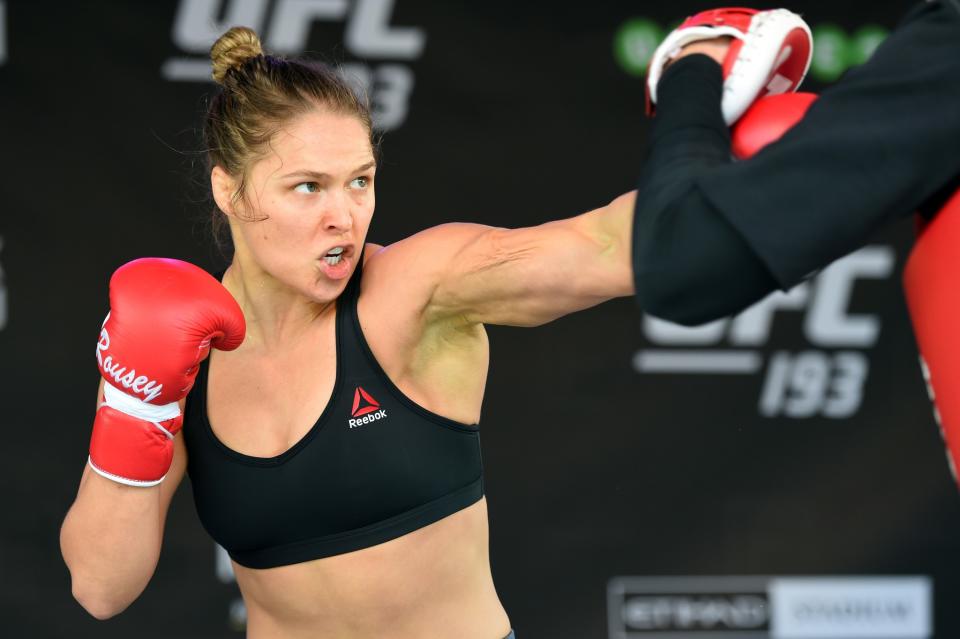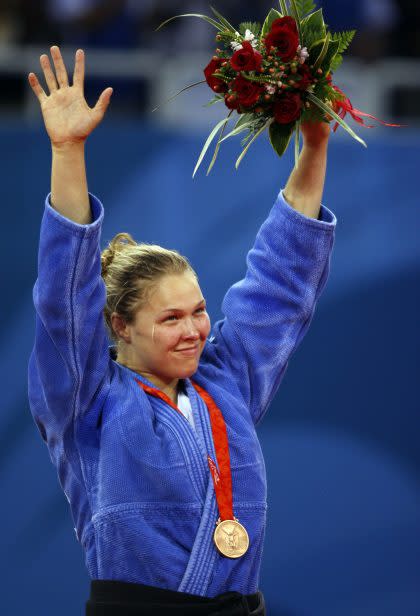Ronda Rousey makes surprising impact at the Rio Olympics

RIO DE JANEIRO — The first question at the opening news conference for the United States women’s freestyle wrestling team was about Ronda Rousey.
When the U.S. women’s boxing team first spoke to the media last week, question after question presented to lightweight Mikaela Mayer revolved around Rousey, the former UFC women’s bantamweight champion.
Kayla Harrison, who on Thursday became the first American, male or female, to win a judo medal in back-to-back Olympics when she repeated as the 78-kilogram gold medalist, dealt with a score of Rousey-related questions.
Female athletes across the spectrum of Olympic sports here have discussed and been asked about Rousey.
“There is a lot of buzz and the question is always like, ‘Are you going to go into MMA next,’ ” American freestyle wrestler Adeline Gray said. “I think we all get those kinds of questions pretty repeatedly.”
That is compelling evidence that Rousey’s popularity is not fleeting. The fact that Rousey hasn’t fought since a shocking defeat to Holly Holm at UFC 193 in November but remains so much a part of the sports conversation not only speaks powerfully to the widespread acceptance of MMA but of her influence upon society.
Rousey has transcended MMA in a way that no other fighter, male or female, has ever come close to doing. She is hugely popular among the UFC’s 18-to-34-year-old male demographic, but she’s as popular or more with women.
Her stance on body shaming issues is one that resonates with so many. As a teenager, Rousey was self-conscious about the size of her shoulders and upper arms, so much so that she frequently wore long sleeves to hide them.
She’s now outspoken about body shaming and is the leader of a movement that embraces the ideal that a muscular and/or fit woman is not outside the norm.
That has not gone unnoticed by women in other sports that have traditionally been viewed as male-only bastions.
“I think there is a beauty standard that is growing that healthy is now strong, not just skinny,” Gray said. “The whole movement now, I think Ronda was a huge part of it. MMA embracing [women in] combat spots has been very progressive from the standpoint of allowing women to be of a more muscular build and have that hard work show and have it be appreciated.
“That’s one of the things I’ve noticed, is that people don’t really look at me like, ‘Oh, you look buff.’ They’re like, ‘You look great. You look healthy. You look strong.’ Those things are starting to be OK as an attribute along with being feminine.”

Rousey’s impact extends far beyond her brilliance in the cage, although her success doesn’t hurt her appeal. Before she went after her second consecutive gold medal, Harrison laughed and said, “The more success I have, the more people are interested in hearing what I have to say.”
But success in the sporting arena only has a limited, short-term appeal, particularly in a sport like fighting. Rousey’s fame has expanded beyond athletics because of her social conscience and willingness to take a stand on issues.
She has worked tirelessly to support women’s body shaming issues and has spoken eloquently regarding depression and suicide. She’s also done work on behalf of people with eating disorders, like bulimia.
Rousey was one of 20 athletes on the list of “Athletes Gone Good” that honors athletes who aim to make a difference in the world.
U.S. wrestler Helen Maroulis said Rousey has helped to erase any stigma that surrounded women who competed in combat sports.
“She was always tough, always accomplished and always a very strong woman,” Maroulis said of Rousey. “MMA just provided the platform for the masses to see that. I think what we’re trying to accomplish with wrestling and [what women in] other combat sports is for people to see you can wrestle, you can go to university, have scholarships and still be feminine if you want. You can be strong, if you want.
“You can be a woman and be proud of your body and Ronda Rousey has done a great job of advocating for that. I think all the Olympic combat sports are doing that. I think it’s really great that MMA has put a light to that and I hope they’ll continue to do it in Olympic sports as well.”
None of the other women combat sports athletes have been able to monetize their participation quite like Rousey yet. Rousey was one of the 10 highest-paid female athletes as ranked by Forbes in both 2015 and 2016, with eight-figure incomes each year. Because of that, many wrestlers, boxers and judokas — among other Olympic athletes — have at least considered MMA as a career in order to use their talents to make a living.
Women’s pro boxers don’t make anywhere near the kind of money the top UFC women make and are nowhere near the league of what Rousey is pulling in. They don’t get endorsements and they don’t get much news coverage.
But perhaps Rousey’s long-lasting legacy will be helping to raise interest in women’s combat sports across all disciplines and by helping women in those sports get on a level playing field with their male peers in terms of compensation and endorsement opportunities.
That, more than her wins in the cage, will be what she is remembered for long after she has left the world stage.



